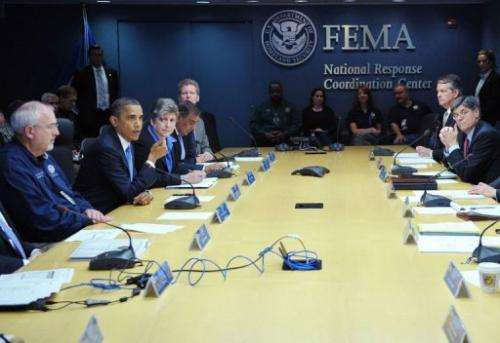US disaster agency tries to dispel social media rumors

FEMA, the US disaster response agency, on Saturday set up a "rumor control" section on its website to dispel misinformation on social networks in the aftermath of superstorm Sandy.
Many Americans have taken to Twitter and Facebook to spread the word about finding supplies in devastated areas of the US East Coast as they struggle to cope with gasoline shortages and power outages—but false information has also emerged.
"Fema.gov/sandy now has a RUMOR CONTROL section for misinformation," the Federal Emergency Management Agency (FEMA) announced on its official Twitter account.
"There is a lot of misinformation circulating on social networks," it added on the new section of its website.
The agency debunked two widely-retweeted rumors. One of these stated that FEMA is giving out $300 in food stamps to anyone who lost power in the deadly superstorm, asking them to call an agency help line.
"1- 800-621-3362 FEMA, $300 food stamps for people who lost power. Pass this along to anyone you know in need. This is for all," one New York-based netizen tweeted.
"This is FALSE," FEMA responded on its website, giving people a phone number to call to find out what kind of assistance is available.
FEMA also discounted a rumor that it is hiring cleanup crews in New York and New Jersey.
Social networks helped provide updates while Sandy crashed ashore on Monday, and have proven useful in mobilizing aid and donations following storm, which killed more than 100 people in the United States.
On Saturday, Charley Shimanski—senior vice president of disaster services at the Red Cross—said social media had been hugely useful in their relief operations.
"This is really a new and tremendous resource for the work that we're doing on this very, very large disaster," he told reporters.
"We can hear the community reaching out to us before other more traditional sources would reach out to us."
But social networks have also proven unreliable at times.
One Twitter user who became an online villain after posting several false tweets about Sandy's destruction was forced to apologize and resign from his high-profile job earlier this week.
(c) 2012 AFP




















